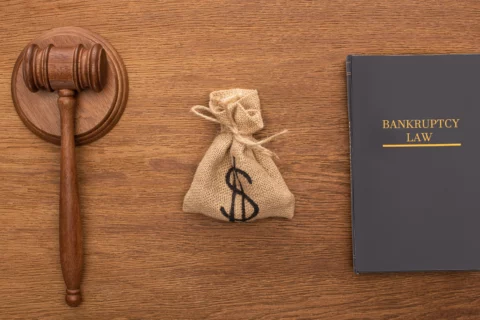Bankruptcy and Medical Debt Relief in Schaumburg, IL
Bankruptcy Can Be A Solution Against Overwhelming Medical Debt
In today’s complex world of healthcare expenses, many individuals grapple with the overwhelming burden of medical debt. Bankruptcy and medical debt relief can be thought of as impossible to happen together, but bankruptcy might be the solution.
Medical debt bankruptcy is the financial strain when healthcare bills accumulate beyond their means to pay.
Quick Summary:
- Bankruptcy is a potential solution for individuals facing overwhelming medical debt in the complex realm of healthcare expenses.
- Medical bills can be discharged through bankruptcy, providing a viable option for individuals burdened by overwhelming medical debt.
- There are two common types of bankruptcy: Chapter 7 and Chapter 13, each with unique implications for handling debts, including medical bills.
- Significant indicators for considering medical debt bankruptcy include overwhelming medical debt, legal actions, and the impact on basic living expenses.
- Several alternatives to bankruptcy are available for managing medical debt.
Can Medical Bills be Discharged Through Bankruptcy?
Yes, medical bills can be discharged through bankruptcy. When an individual faces overwhelming medical debt, filing for bankruptcy can be a viable option to obtain relief.
What Bankruptcy Types Can Manage Medical Debt?
There are different types of bankruptcy filings that individuals can consider, each with its implications for handling debts, including medical bills. There are two common types of bankruptcy for individuals: Chapter 7 and Chapter 13.
Chapter 7 Bankruptcy
Chapter 7 can significantly impact medical debt, offering a potential avenue for relief and a fresh financial start.
- Discharge of Medical Debt: This bankruptcy type allows the discharge of certain unsecured debts, including medical bills, relieving you of legal obligations to repay eligible debts.
- Liquidation of Assets: While non-exempt assets may be potentially liquidated, most Chapter 7 cases are “no-asset,” meaning there are often no assets available for distribution to creditors.
- Protection of Exempt Property: State and federal laws provide exemptions safeguarding essential items like homes, cars, clothing, and household goods from being sold to repay debts.
- Speed of Discharge: Known for its relatively quick process, Chapter 7 typically takes a few months from filing to discharge, providing a faster resolution for those burdened by medical debt.
- Relief from Collection Efforts: Upon filing, an automatic stay halts most collection efforts, including those for medical bills, offering temporary relief to address your financial situation.
Remember, not all debts are dischargeable in Chapter 7. Obligations, such as recent tax debts, child support, and alimony, may not be eliminated.
Chapter 13 Bankruptcy
Chapter 13 bankruptcy presents a systematic method for individuals with regular incomes to reorganize debts, establishing a manageable repayment plan spanning three to five years. In the context of medical debt, here’s how Chapter 13 typically operates:
- Inclusion in Repayment Plan: Medical debt and other unsecured debts are usually part of the tailored Chapter 13 repayment plan. The plan (based on your income and expenses) delineates monthly payments to a trustee, who then distributes funds to creditors.
- Debt Consolidation: Chapter 13 allows the consolidation of various debts, including medical bills, into a single monthly payment. This streamlined approach facilitates more manageable repayment over the specified period, fostering a structured financial recovery.
- Potential Debt Reduction: Some cases may see a reduction in the total amount of unsecured debt, contingent on factors like disposable income and non-exempt asset value.
- Asset Protection: Compared to Chapter 7, Chapter 13 preserves your assets without liquidation, proving advantageous for those with valuable assets they wish to retain, such as a home or a car.
- Repayment Plan Completion: Upon successful completion of the repayment plan, any remaining eligible unsecured debts, including medical bills, may be discharged, legally releasing the obligation to repay.
- Automatic Stay: Similar to Chapter 7, filing for Chapter 13 triggers an automatic stay, temporarily halting most collection efforts and offering relief from creditor actions related to medical bills.
While Chapter 13 offers a structured approach to managing medical debt, assessing the pros and cons and exploring alternatives are crucial to making an informed decision aligned with individual circumstances.
Are There Any Disadvantages From Filing for Medical Debt Bankruptcy?
Filing for bankruptcy is a significant financial decision with immediate and long-term consequences. Here are some disadvantages of filing for bankruptcy, particularly in the context of medical debts:
- Credit Score Impact: Filing for bankruptcy can severely impact your credit score. A bankruptcy record can stay on your credit report for several years. That will make it challenging to qualify for credit or loans in the future. That can also affect your ability to buy a house, get a car loan, or even secure a credit card.
- Difficulty Obtaining Credit: Even if you can obtain credit after bankruptcy, it is likely to come with higher interest rates and less favorable terms. Lenders may view you as a higher risk. That can also make it more expensive to borrow money.
- Asset Liquidation: Depending on the type of bankruptcy, you may need to liquidate certain assets to pay off creditors (Chapter 7). That can include selling valuable possessions.
- Public Record: Bankruptcy is a public record, and your financial history becomes more transparent. Potential employers, landlords, and others who need to know your financial stability can access this information.
- Limited Access to Future Credit: Even after bankruptcy, it may be challenging to access credit immediately. Some lenders may be unwilling to extend credit until your financial situation has stabilized. Even then, terms may not be as favorable as they would be for someone with a clean credit history.
- Limited Effect on Certain Debts: While bankruptcy can discharge many debts, the discharge of certain obligations are not allowed, such as student loans and recent taxes. Medical debts are generally dischargeable, but the specifics depend on the circumstances.
- Rebuilding Credit Takes Time: Recovering from bankruptcy and rebuilding your credit score is gradual. It may take several years of responsible financial behavior to prove creditworthiness to lenders.
Should I Check for Alternatives Other Than Bankruptcy?
Yes, several alternatives exist before considering medical debt bankruptcy. Individuals facing financial challenges due to medical bills may explore the following options:
- Negotiation with Creditors: Contact medical providers to negotiate reduced payments, interest rates, or settle for a lump sum less than the total owed.
- Financial Counseling: Seek advice from a credit counseling agency to create a budget, negotiate with creditors, and explore debt management plans.
- Medical Bill Advocacy: Hire a medical billing advocate to review bills for errors, overcharges, or items covered by insurance, potentially reducing the overall amount owed.
- Government Assistance Programs: Explore available government assistance programs that may help cover medical expenses, especially during significant financial changes. These include Medicaid, Children’s Health Insurance Program (CHIP), Medicare, The Affordable Care Act (ACA) / Health Insurance Marketplace, and Consolidated Omnibus Budget Reconciliation Act (COBRA).
- Home Equity Line of Credit (HELOC): If you own a home, a HELOC might be an option for consolidating debt. However, caution is necessary as it involves using your home as collateral.
- Legal Aid Services: Consult with legal aid organizations or pro bono services for advice on handling medical debts without filing for bankruptcy.
- Budget Adjustments and Income Increase: Evaluate and adjust your budget, find additional income sources, or explore loan refinancing to increase income and reduce expenses.
It is crucial to carefully weigh these alternatives, considering the specifics of your financial situation, before making any decisions. Professional advice can provide valuable insights into the most effective course of action tailored to your circumstances.
Our Bankruptcy Attorneys are Ready to Help You
Our law firm, Cutler & Associates, Ltd., is your trusted ally in Schaumburg, IL. We will help you face the complexities of medical debt bankruptcy. One of the primary advantages of seeking legal help is the ability to explore various options tailored to your unique situation.
This personalized approach sets the stage for a more favorable outcome in medical debt bankruptcy. With a commitment to guiding bankruptcy and medical debt relief, our bankruptcy attorneys offer legal services to help you navigate overwhelming medical expenses. Get a free consultation today!


